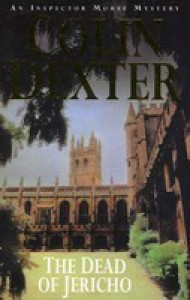

5/13 of the mystery novels by Colin Dexter featuring Chief Inspector Morse and this one, published in 1981, was a worthy winner of the CWA Silver Dagger. The book is split into a prologue, four books and an epilogue, but curiously, Morse doesn't assume the lead of the investigation into the death of a passing female acquaintance until the start of Book 3 and DS Lewis is also belatedly introduced over halfway in. Of course the benefit for Morse is that unfettered by investigative protocols at the outset, he is able to deploy some unconventional tactics and privately question whether the victim had indeed committed suicide. However, we can also see the stabilizing influence of Lewis, keeping his superior grounded and challenging the more fanciful inventions of Morse's prodigious imagination.
The crime is set in 'Jericho' which is apparently a former industrial area of Oxford alongside the canal and though the lack of a reliable provenance for the name is intriguing, I enjoyed the map, which enabled the reader to follow the street and landmark references. We also learned that Morse is now fifty years old, so three years have seemingly passed since the previous novel.Still, it is the contrasts, wealth and poverty, culture and depravity, learned and illiterate, attractive and ugly, which again permeate the characters and present a sometimes sordid display of human behaviour. Meanwhile, the enigma that is Morse, a flawed genius subject to the vagaries of imperfect instincts, is exposed just a little more and the longsuffering Lewis has to bite his tongue in the face of tetchy, diva-like tantrums from his volatile boss.
The plot is deceptively simple, but the clues are deftly assembled and rearranged as Morse veers off on fruitless tangents, only for his hypotheses to be dismantled and constructed anew in the light of changed evidence. Of course, the quaffing of beer remains central to all the meaningful progress in the case, but it is also in these moments, typically shared by Morse and Lewis, that shine a dull light on the burgeoning intimacy of their relationship, such as when Morse asks his sergeant why he calls him 'sir'.
It's interesting that in the TV adaptation, it was hard not to be enthralled by the character played by John Thaw. On the page though, it's equally hard not to find the brilliant Chief Inspector a rather tragic and dislikeable man. Perhaps, It is the presence of Lewis that deliberately keeps Morse honest and anchored among mere mortals, but it is a pretty thankless task!

 2
2












